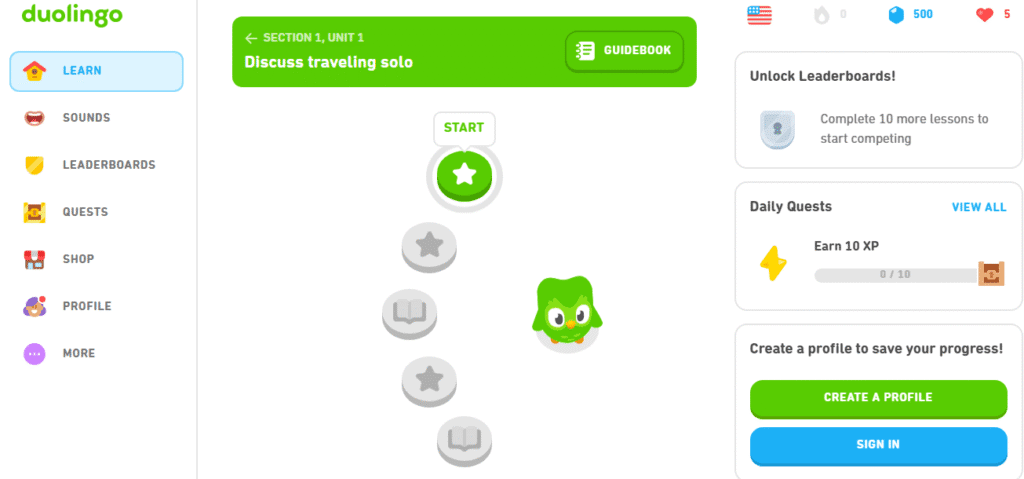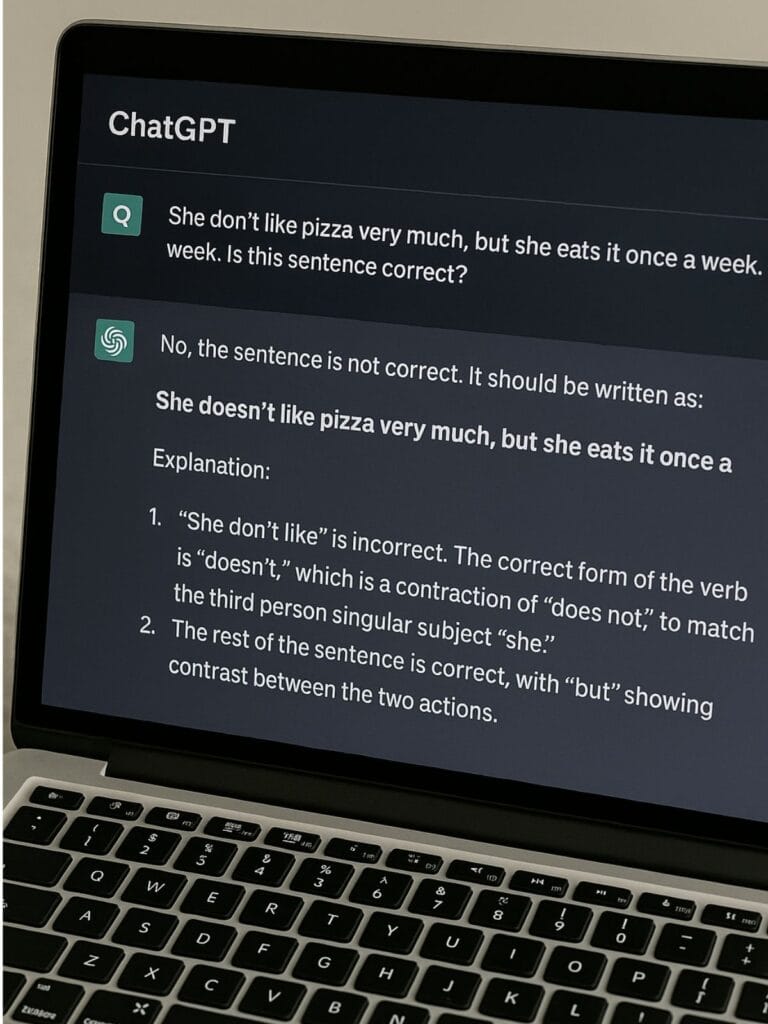Introduction
There’s never been an easier or more convenient time to learn English. When we reach 2025, whether you want to learn as a complete beginner or just want to improve your being fluent in English, free resources are abundant online. Resources like AI-powered applications, YouTube channels, conversational practice platforms, and cell phone games – you will have no limits on free ways to learn English.
This guide will help you learn English online for free in 2025 with proven tools and techniques – even with zero budget.
Why Learn English in 2025?
Now that we have discussed the “how”, let’s quickly touch on the “why”.
- Global Language: 1.5 billion people speak English around the world and it is the official language (or the primary language) in over 50 countries.
- Career Development: English is important for international business, technology and remote work. English fluency is a requirement in many of the highest paying jobs in the USA, UK, Canada and Australia.
- Make Travel Simple: Using English you can communicate in almost every country. Airports, hotels, and restaurants use English, making it a standard communication medium for international customers.
- Access to Knowledge: Most of the educational content available on the internet is found in English. People can take courses from Harvard or learn how to fix their car through YouTube, all because of English.
Even if you live in a non-English speaking country, learning English gives you the opportunity to connect with people, ideas, and opportunities well beyond their borders.
Step 1: Make Clear and Measurable English Learning Goals
Before we jump into resources, let’s define what you’ll achieve. Having clear goals can help direct your resources and keep you motivated at the same time.
Examples:
- “Speak English fluently in 6 months.”
- “I will learn 10 new English words, every day.”
- “I want to understand English podcasts without English subtitles.”
- “I want to write professional emails in English.”
Use a digital journal or Google Docs to track weekly goals like:
- Practiced for 30 minutes per day
- Learned 5 idioms
- Participated in an English conversation club
- Watched 3 tutorial videos in English
Using SMART goals (Specific, Measurable, Achievable, Relevant, and Time-bound) can be a good way to help monitor your progress and remain accountable.
Step 2: Use Free Apps to Learn English
Learning apps can be fun, mobile, and an easy way to make learning English part of your normal routine. Many apps offer ‘bite-sized’ lessons you can complete on trip, while you are waiting or taking a break!
1. Duolingo
- Best for: Beginners and vocabulary
- Why to use: Free, gamified lessons, short and helpful.
- Pro tip: Setup daily reminders for 10-minute sessions!

2. BBC Learning English
- Best for: Grammar and listening
- Why to use: Professional lessons and updated daily!
- Bonus: You can also find lessons in business English and academic English.
3. HelloTalk or Tandem
- Best for: Speaking with native speakers.
- Why to use: Free language exchanges with users across the world!
- What you get: Voice message capabilities, text corrections, and even video calls.
4. Google Translate + Phrasebook
- Best for: Quick vocabulary look up and practice
- Tip: Save helpful phrases in your phrasebook to review daily
- Bonus Tip: Use the conversation mode to translate back and forth in real time while chatting
5. LingQ
- Best for: Reading and vocabulary
- Why to use it: Because you can learn from real content like stories, articles, and interviews
Not only are these apps great for vocabulary and grammar, they also expose you to functional daily english expressions.

Step 3: Watch YouTube Channels for Real English Exposure
Video is a fun and engaging way to learn. You are learning pronunciation, tone, cultural context, and listening comprehension.
Below are the free top YouTube channels in 2025 to learn English online:
- Speak English with Mr. Duncan: Fluency and idioms
- BBC Learning English: Grammar, news, real-life use Reliable and clear
- English Addict: Spontaneous speech Builds confidence
- English with Lucy: Phrases, vocabulary, accent Elegant, educational
- RealLife English: Global English Ideal for non-native speakers
Pro Tip: For the best outcome, watch videos with English subtitles, you will gain both listening and reading skills, and you can replay some of the challenging sections to train your ear.
You could try:
- Watching it once with subtitles
- Watching it again without English subtitles
- Summarizing what you understand in English
Step 4: Listen to Podcasts/Audio Books
Listening is perhaps one of the fastest ways to improve fluency and pronunciation. Podcasts and audio books are both free and flexible because you can listen to them while walking, preparing food, or relaxing.
The podcasts for learning English in 2025 are:
- ESL Pod – Basic, clear audio lessons
- The English We Speak (BBC) – Learn Slang and expressions
- All Ears English – Natural English for real world situations
- Luke’s English Podcast – Humor, culture, and advanced listening
Platforms to listen to podcasts for free:
- Spotify (Free)
- Google Podcasts
- Audible (free trial includes free audio books)
- Castbox
Listening will help you train your brain to think English and also help you with your confidence in pronunciation.

Step 5: Practice Speaking English Every
Speaking is probably the hardest skill, but also possibly the most important. Speaking is essential to be fluent. Here are ways you can practice for nothing:
Free Speaking Websites:
- Tandem or HelloTalk – find a native English speaker to match with
- Speaky.com – video chat with learners from all over the world
- Discord English Servers – join any of the free voice rooms or discussion boards
- YouTube Shorts Duet Feature – record your responses to English questions
You can also challenge yourself:
- Talk to yourself in English about your day
- Practice ordering food or asking for directions
- Record some short voice notes and assess your style of speaking and pronunciation
- Take part in online group meetups or language cafés
If you practice speaking for even 5 mins a day, you will see a difference over time.
Step 6: Read Blogs, Stories, and News in English
Reading is great for developing vocabulary and seeing grammar in context. Research shows that learning new words in complete sentences, such as when discussing news stories or blog posts, is much easier to remember and use than with lists.
FREE RESOURCES:
- VOA Learning English – News in simple English.
- Breaking News English – Articles + vocabulary and quizzes.
- Story berries – Short stories with illustrations.
- Simple Wikipedia – Simple explanations of everything.
- The English Club – Articles and grammar blogs.
Try reading aloud. You can improve your English pronunciation and you can internalize sentence structures.

Step 7: Write in English every day
Writing is also the most under appreciated and underused tool in language learning. Writing forces you to engage with new words and grammar, rather than just thinking about them.
Writing ideas for beginning students:
- Write a description of your day in 5 sentences.
- Write an email to a friend.
- Write a summary of a movie or a book.
- Write a diary/blog post entry describing your goals.
You can also use:
- Grammarly (Free) – To check your grammar and spelling.
- Language Tool – Free AI grammar and style checker.
- Hemingway editor – To simplify and strengthen your sentence structure.
Any other social platform where you can engage with English; I would suggest writing an English blog or Instagram and posting simple daily reflections or tips.

Step 8: Use AI Tools to Learn English (For Free!)
AI will be very useful for you in 2025. You may already know that AI tools are available, free, and tailored to your individual learning preferences.
Best Free AI Tools:
- ChatGPT (Free Version) – Inside the free version, you can practice running dialogues, and openly ask ARM or better grammar questions.
- QuillBot – you can paraphrase your writing to get better.
- YouGlish.com – You can hear any word pronounced by a native speaker.
- Talkpal.ai (Free trial) – You can talk with your ai speaking partner and practice conversations.
In ChatGPT, you can even copy your writing and ask ChatGPT to suggest changes to make it sound more natural or more professional.
Example Prompt for Chat GPT would be:
“Act like an English tutor. Let’s practice speaking English conversation about a job interview.”You are ready to show off your new writing with your AI assistant!

Step 9: Use games and flashcards to learn quicker
Gamification encourages your brain to learn and keeps learning fun. You can use flashcards, quizzes, and games to build vocabulary and grammar knowledge which helps with memorizing.
Best Free Game Platforms:
- Memrise: lessons that use real vocabulary and audio clips of the vocabulary.
- Quizlet: categories of flashcards that range from grammar to idioms.
- Wordshake by British Council: a word game you play online.
- Freerice.com: learn English & donate food through United Nations.
You can use their form or create your own flashcards or just add to a community form of flashcards that are specific for your learning purposes.

Step 10: Find Free Online Courses and Forums
Choosing structured courses with actual instructors can help you discover more about grammar and test prep.
Some Free Course Websites:
- Alison.com – Free English certificate courses
- Coursera (Audit Free) – Free university-level courses from top schools
- FutureLearn – Find English courses for professionals and students
- EdX – Free courses by Harvard, MIT and others with English subtitles
Forums or Communities:
- Reddit – EnglishLearning – Ask questions and share information
- Facebook Groups: “English Learning Club,” “Spoken English Practice”
- English Stack Exchange: Get help from expert learners
The forums will provide a way to stay engaged while also providing a way to ask for feedback live.
📅 Daily English Learning Routine (Sample Plan)
| Time | Activity |
| 8:00 AM | Duolingo or Memrise (15 mins) |
| 10:00 AM | Watch a YouTube lesson (20 mins) |
| 1:00 PM | Listen to a podcast while walking |
| 4:00 PM | Chat on HelloTalk or Discord |
| 7:00 PM | Read 1 article + write 5 sentences |
| 9:00 PM | Use ChatGPT to review your writing |
Whether you have one or two hours a day, consistency will always beat intensity.
Bonus: Mistakes to Avoid When Learning English Online
- Not Speaking – There is no way to fluency without speaking.
- Only Learning Grammar – Mix grammar with vocabulary and real use.
- Not Having a Study Plan – Studying randomly wastes time and is inefficient.
- Trying to learn Everything – Learn step-by-step
- Being Afraid of Making Mistakes – Mistakes are very important learning opportunities.
🎯 Conclusion: You Don’t Need Money to Teach Yourself English in 2025
You have a free path to learn to speak English fluently—you just have to have the right tools and put in consistent daily practice. Whether your tool is a phone app, an AI chatbot, a podcast, or a YouTube channel, the resources you need to achieve your goals are out there for your free use on the internet.
Start small. Decide what your goals are. Follow your plan. Don’t quit when it gets hard; remember why you started.
By the end of 2025, maybe you’ll be giving others English advice!



3 Responses